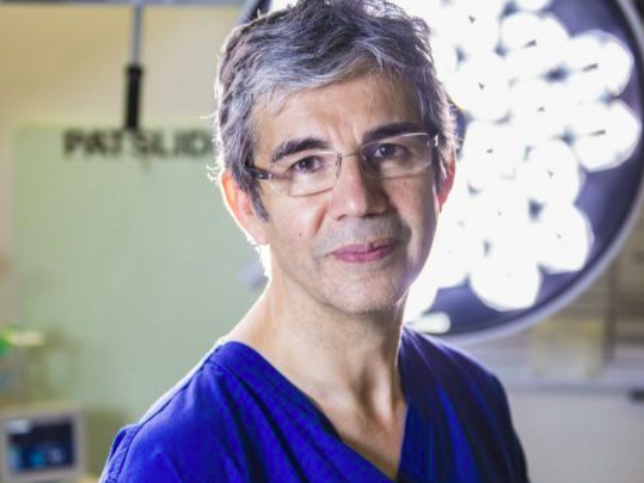Fighting the coronavirus is worse than operating in Syria, says war trauma surgeon
'If [people who flout social distancing rules] went to work as I do every day and saw how catastrophic it really is, they would stay home,' says Dr David Nott

Your support helps us to tell the story
From reproductive rights to climate change to Big Tech, The Independent is on the ground when the story is developing. Whether it's investigating the financials of Elon Musk's pro-Trump PAC or producing our latest documentary, 'The A Word', which shines a light on the American women fighting for reproductive rights, we know how important it is to parse out the facts from the messaging.
At such a critical moment in US history, we need reporters on the ground. Your donation allows us to keep sending journalists to speak to both sides of the story.
The Independent is trusted by Americans across the entire political spectrum. And unlike many other quality news outlets, we choose not to lock Americans out of our reporting and analysis with paywalls. We believe quality journalism should be available to everyone, paid for by those who can afford it.
Your support makes all the difference.A trauma surgeon who operated in some of the world’s worst war zones has said that fighting on the front lines of the coronavirus crisis is an “intense experience” and is as bad as “seeing children blown up in Aleppo”.
Dr David Nott is a world-renowned trauma surgeon from Carmarthen, Wales. He has been a consultant surgeon at Chelsea and Westminster Hospital for 23 years.
In an interview with The Sunday Times, Dr Nott – who goes into war-torn zones to work for aid agencies on an annual basis – spoke about his experience working to save Covid-19 patients on ventilators at St Mary’s Hospital in Paddington.
He called the pandemic “the most frightening enemy” he has ever faced, and warned of NHS staff suffering post-traumatic stress disorder (PTSD) because the fight against the virus is “emotionally destroying”.
Nurses were “the real heroes” in his eyes, while he was just a “tiny, tiny cog in this most amazing machine”.
“To be with patients so seriously sick for 13 hours a day, wearing masks on their face which cause so much discomfort,” said Dr Nott. “I have never seen people work so hard, so desperate for each individual patient to get through their sickness.
“But sometimes the disease wins,” he admitted.
The merciless, non-uniform way Covid-19 affects those it infects is still an enigma, said Dr Nott. “A lot of people we have on our unit are quite young, in their 20s, 30s, 40s and 50s. Why some have a mild illness and others have huge problems and go down really rapidly, even though they have no underlying conditions and are completely fit and well, is a mystery nobody understand,” he said.
But the main problem, particularly among elderly patients, is that breathing becomes such an “effort” that they become too tired and “can’t breathe any more”.
The Welsh doctor, who runs the David Nott Foundation which trains doctors working in war and natural disaster zones, decided to keep his wife and two young daughters in a separate living space to minimise the risk of them becoming infected, as they would be “sitting ducks for anything I brought back”.
He said being away from his family felt like the Second World War, “with evacuees leaving their families”.
Dr Nott said he “never imagined” that doctors in the UK would have to make decisions about who to treat in hospitals here as he does in war zones, and knowing “which patients can live, which are futile to operate on”.
Dr Nott is hopeful the crisis will “reset minds so people realise the human race is one big family”.
“We’re only on this planet once, we’re all in it together and any of us can go down at any time,” he added.
Join our commenting forum
Join thought-provoking conversations, follow other Independent readers and see their replies
Comments